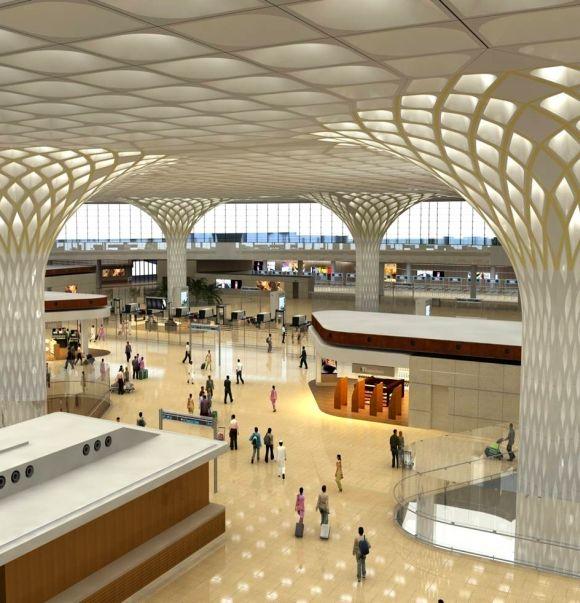
Apart from handling 40 mn flyers a year in an area of just 1,400 acres, the new airport terminal will showcase a 3-km-long art wall & peacock-inspired design.
The design gives the impression of a thousand white peacocks in the sky; the 60-foot-tall walls have nearly 7,000 artefacts (some dating back to the 10th century) and as many as 1,000 lotus-shaped imported chandeliers greet you as you enter the state-of-the-art four-level building.
It also has 226,000 sq ft of retail space offering everything that money can buy and over 53,000 sq ft of landscape, with 70 different plant species and giant waterfalls.
And, all of these are right in the heart of India’s commercial capital, where land, according to some GVK executives, is — and will remain — a four-letter word.
Welcome to Terminal 2 (T2) at Chhatrapati Shivaji International Airport in Mumbai’s Sahar that is due to be inaugurated by the prime minister on Friday.
…
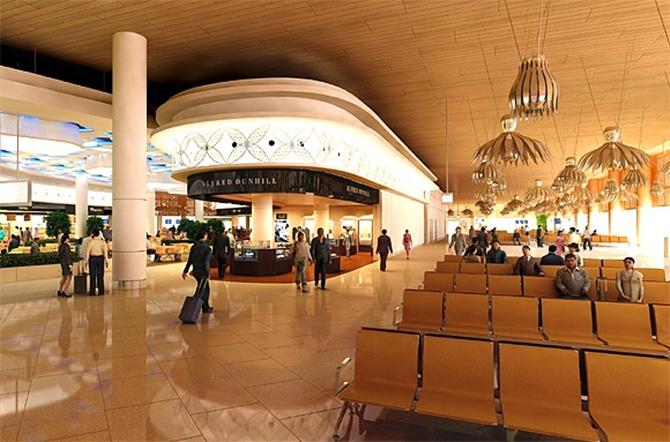
While GVK executives are still tight-lipped on when operations will begin, as a lot of security drill is still in process, the signboards all over the terminal are a giveaway: These remind everybody to be ready for the D-day in only 10 days; this means passengers will get to experience the real thing on January 15.
…
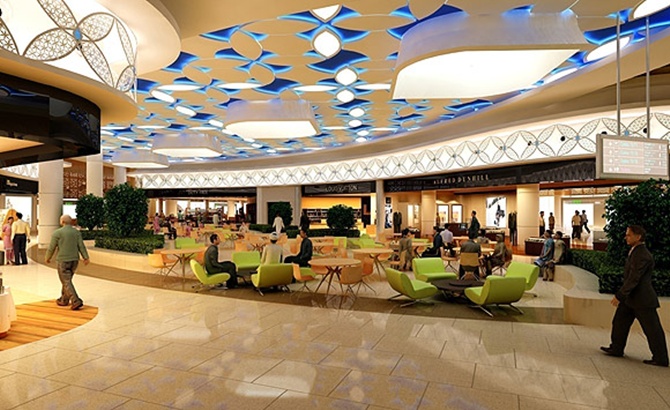
The sheer opulence of a grand new year gift to the city can take one’s breath away (a GVK executive says, tongue firmly in cheek, there should be a contingency plan for passengers who would refuse to leave the airport), while the small details of the plan to handle 40 million passengers a year (the current figure is 32 million) are where the biggest achievements lie.
…
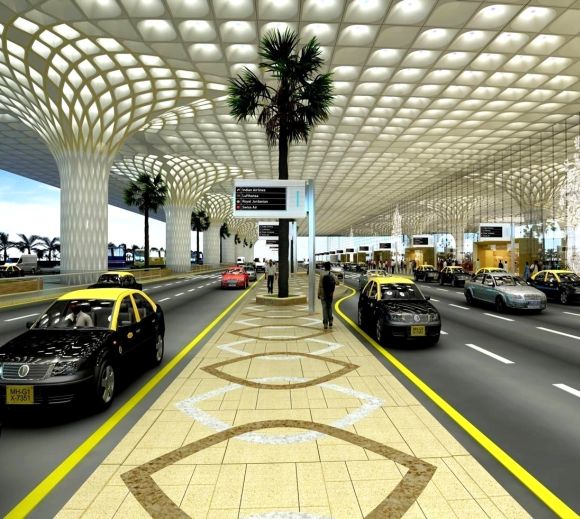
What T2 offers
Consider this: After you drive through India’s only landscaped six-lane road from the Western Express Highway to the airport, you will reach the country’s biggest parking area, with a capacity to park 5,200 cars. You can drop off your bag on the conveyor belt right at the terminal gate, making trolleys redundant.
The first scan of the baggage will be done right at the gate and if the system detects a foreign object in a bag, robotic arms will pick the bag up and isolate it.
…
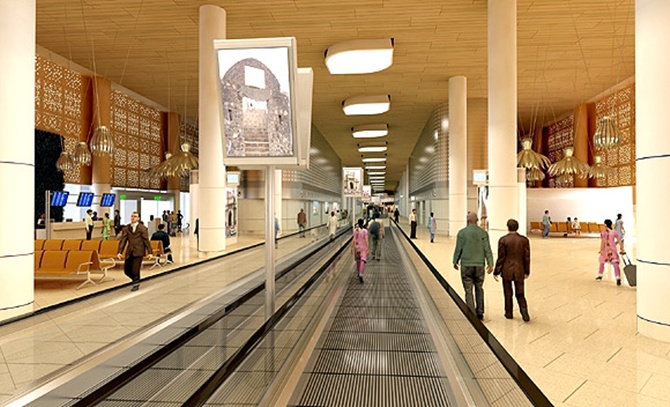
Both international and domestic passengers (the latter will have to wait for another year, as more work needs to be done) will use a common check-in process in the integrated terminal.
The arrival area will have 18 carousels and the departure area will have 22. For frequent travellers hassled by the current airport’s cramped check-in counters and serpentine queues, T2 has 50,000 square metres of check-in halls.
…
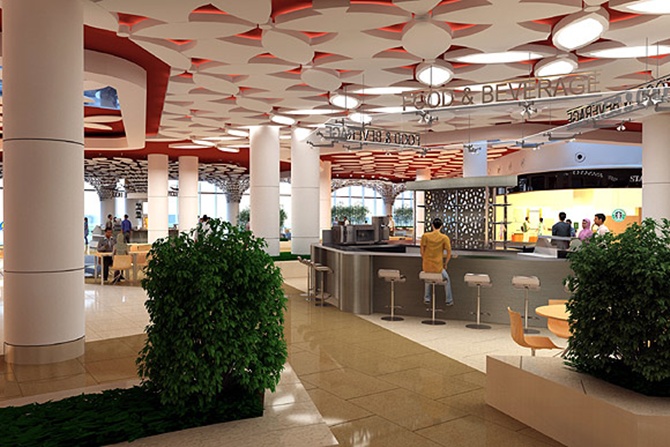
For one example of how passenger comfort has been taken care of, the distance from the last departure gate to the entry area at T2 is 450 metres (it’s 750 metres in Delhi). In the case of arrivals, the distance is longer, at around 600 metres.
There’s more. The terminal has 188 airline-agnostic counters. During the day, natural light will come right through the little openings in the sky roof, reflecting peacocks on the floor.
The first-class or business-class lounges will also be airline-agnostic — the first such experiment in India.
…
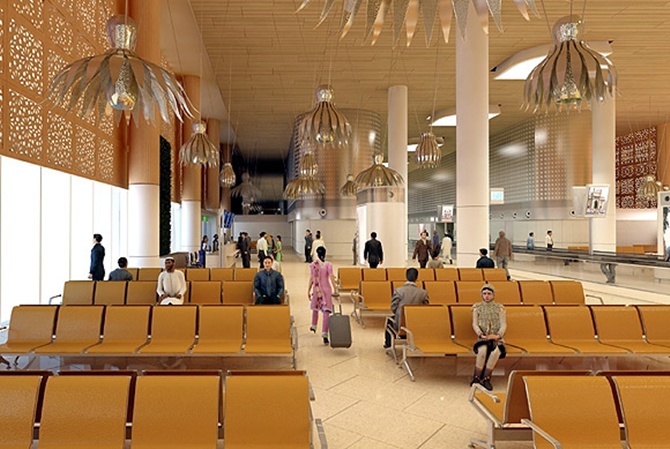
Besides, T2 has a 11.6-metre airport escalator (the tallest in India), 72 lifts, 48 escalators and 40 travelators.
The all-glass terminal has used one million sq ft of glass. The logic: Everyone wants to see aircraft taking off but doesn’t want to hear the roar of the engine. A second layer of glass has been used to minimise noise.
One of the major highlights of T2 is, of course, the mega roof that covers around 50,000 sq m of space - equivalent to 10 football fields. It has been built with 18,000 tonnes of structural steel that, experts say, is enough to build two Eiffel towers.
…
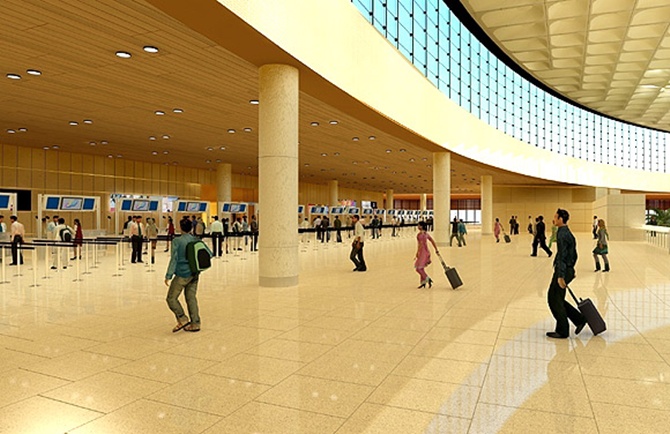
To get a sense of the scale, consider the apron area (area to accommodate aircraft for loading or unloading passengers, mail or cargo, fuelling, parking or maintenance).
This is enough to conduct several football matches simultaneously. And the number of passenger boarding bridges carrying passengers between the aircraft and terminal is being increased from 11 to around 70.
The art walls, named Jaya He, are something no other airport in the world can boast of. In the departure area itself, artefacts occupy 80,000 sq ft and curve along the contours of the terminal building.
…
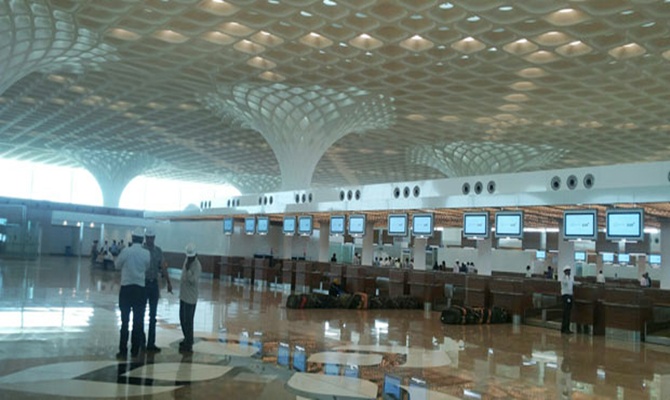
The displays include delicately-carved doorways, decorative torans, terracotta horses, lamps, wooden temple chariots, masks, bows of snake boats, mythical creatures, etc.
A comparison with the Delhi airport's Terminal 3, which started operations in 2010, shows T2 has managed its cost reasonably well. In fact, people close to the project say the cost per passenger at T2 will be 40 per cent less than Delhi's T3.
That's because while the T2 space is 20 per cent smaller (4.4 million sq ft, compared with T3's 5.4 million), it can handle 20 per cent more passengers (40 million, compared with Delhi's 34 million).
…

The cost per sq ft of T2 is around Rs 12,000, taking the terminal project cost to Rs 5,500 crore (Rs 55 billion). The total project cost, including the ecosystem around the terminal, is Rs 12,500 crore (Rs 125 billion).
GVK's Mumbai International Pvt Ltd (MIAL), which bagged the mandate to operate, manage and develop the country's busiest airport in 2006, surely knows how to convert a crisis into an opportunity. And, it clearly sounds like an understatement MIAL executives say the Mumbai airport is the most constrained airport in the world.
Here's why.
…
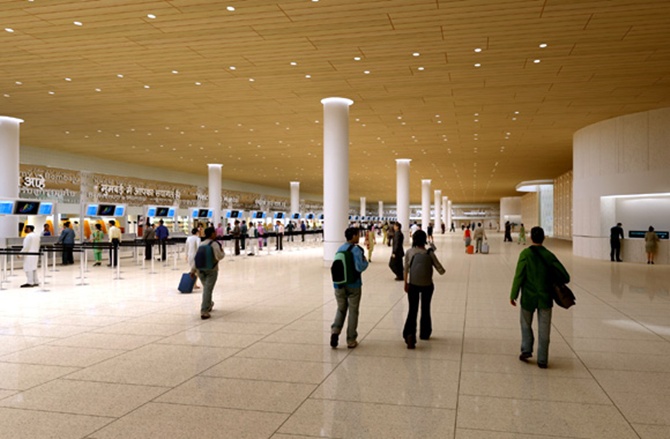
The net land area of the Mumbai international airport is 1,400 acres, compared with Hyderabad's 5,500 acres, Delhi's 5,100 acre and Bangalore's 4,000 acres. Even Malaysia's Kuala Lumpur airport, which handles the same number of passengers as Mumbai, has over 30,000 acres of land at its disposal.
The land shortage is because the Mumbai airport is surrounded by the Mithi river on one side, 300 acre of slums housing 400,000 people on the second, while the third side has a nullah that flows into the Mithi river.
GVK executives also jokingly say it will not be wrong to term T2 as a "demolition project", as over 6.5 million sq ft of built space had to be demolished because the earlier offices located there made inefficient usage of space.
Naturally, there was a lot of cajoling to do. As a result of that, the Sahar Police Station, which had to be demolished, is probably now the only police station in India that looks like a corporate office, with a gymnasium.
…
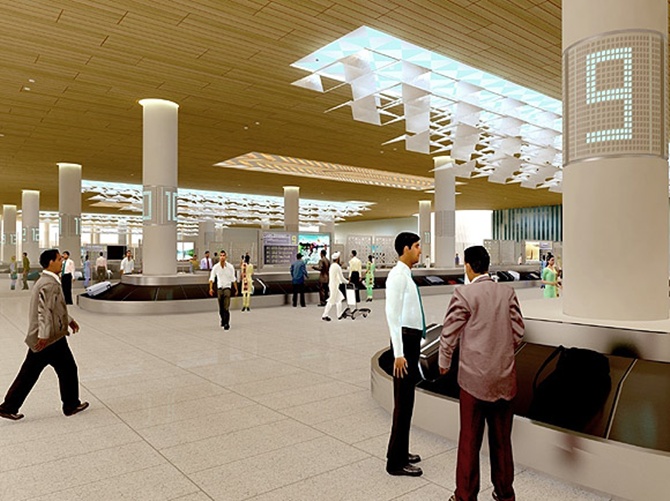
But that was loose change compared to some other hair-raising experience GVK executives had to face. For example, the company staff had a first-hand experience of Mumbai's famous underbelly when a lady in his late fifties, who owned a few stores inside the airport area, came to the negotiating table and the first thing she did was to put a gun on the table.
GVK has its lips sealed on the returns on its investments, but the main money will come in from outside the terminal area where the company has 20 million sq ft of commercial space ready to be bid out.
…
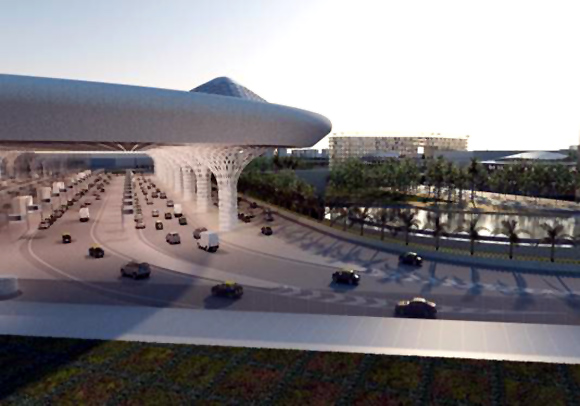
To put things in context, the area is more than the Bandra-Kurla complex. Already, 1.5 million sq ft has been bid out. On its airport assets, GVK has been offered 16 per cent returns on its Rs 2,200-crore (Rs 22 billion) equity.
Though GVK is confident, the jury is out on whether the efforts will be enough for the Mumbai airport to reclaim from Delhi its position as the country's aviation hub, with an increasing number of airlines choosing the latter as their operations base.
…

For the moment, it's celebration time. For, GVK has actually pulled off a coup.
As you head towards the garden outside the departure hall, a GVK executive draws attention to 10 masks of asuras (demon) that have been strategically put on the walls of what is expected to be the busiest corners of the airport.
The purpose is to ward off evil. Going by the progress of work, the asuras seem to be doing their job exceptionally well.